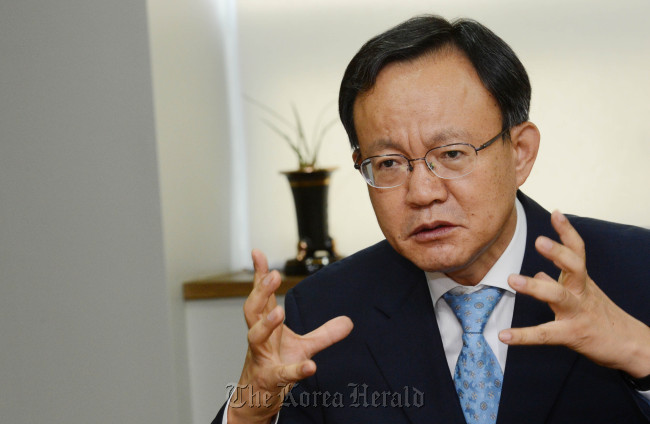Secretary-general of UNESCO Korea speaks on various conflicts
including Arirang Prize controversyIn October of 2009, the Cultural Heritage Administration of Korea officially announced it would abolish the UNESCO-Arirang Prize, terminating its funding for the prize.
The award, first established in 2001, was created to honor individuals or groups who protect spaces or forms of traditional cultural expression, that are listed in the UNESCO “Masterpieces of the Oral and Intangible Heritage of Humanity.”
Prior to the 2009 abolishment, the Korean government gave $30,000 worth of prize money to the winners in the name of UNESCO and “Arirang,” Korea’s national folk song. The state-run institute back then had no idea it would have an ownership dispute over the song with another country two years later.
“I was very against the idea of abolishing the award, and told the cultural administration (not to cancel the award),” Chun Taeck-soo, the secretary-general of UNESCO Korea, who took office in 2008, told The Korea Herald in an interview last week.
“If the award still existed, more international figures, including the ones who work for UNESCO, would be aware that the song ‘Arirang’ has always belonged to Korea.”
During Chun’s years at the helm of UNESCO, UNESCO designations of cultural heritage have become something rather political.
Last year, China announced its controversial decision to list “Arirang” ― as well as other cultural practices of ethnic Koreans living in the Yanbian Korean Autonomous Prefecture in Jilin Province ― as its National Intangible Cultural assets, and seek registration as China’s UNESCO World Heritage. To thwart China’s claim, Seoul submitted its official application for a UNESCO designation for “Arirang,” in all its regional forms, earlier this month.
Chun said while it’s a shame that the Korean government abolished the UNESCO-Arirang prize, most people seem to have forgotten the initial purpose of the UNESCO designations.

Chun Taeck-soo, secretary-general of the Korean National Commission for UNESCO, speaks during an interview with The Korea Herald on June 12. (Chung Hee-cho/The Korea Herald)
“The whole point of the UNESCO designations is to well-preserve these cultural sites and assets,” said Chun.
“If we do not preserve and keep protecting them, these assets will disappear sooner or later. Our designations are to encourage the given country to take care of them, so our future generations can enjoy and appreciate them as well.”
“Arirang” isn’t the first cultural asset to be disputed over its UNESCO listing. The ownership dispute between countries over its cultural heritage ― and its UNESCO designation ― has a history. The most famous case involves Preah Vihear Temple, which is located on the border between Cambodia and northeastern Thailand. The temple has been at the center of a border dispute between the two countries for more than a century, even after the International Court of Justice awarded its ownership to Cambodia in 1962.
The dispute once again escalated when Cambodia submitted its application for the temple’s UNESCO listing in 2008. On July 8 of the same year, the temple was added to the UNESCO World Heritage list as a Cambodian property. The UNESCO decision enraged many Thai nationalists and eventually triggered several serious military clashes in the disputed site through 2011― which forced a vast number of people in the area to flee.
“The case of Preah Vihear Temple is the total opposite of the initial purpose of UNESCO listing,” said Chun.
“In such severe situations, UNESCO may suggest joint-listing as a peaceful measure to solve the problem. This is not to say I’d like to suggest ‘Arirang’ to be joint-listed with China. I’m emphasizing the initial purpose of UNESCO designations. While UNESCO may suggest it (as a diplomatic gesture), there is no way for the UNESCO to force two countries to apply as a joint-effort. A joint-designation can only happen when the two parties agree on it. Some of the joint-listing of cultural heritage in the past include falconry, which Korea shares with 10 other counties such as France and Qatar.”
Domestically, UNESCO designations have been creating other kinds of political debates and controversies. Last year, when documents on the pro-democracy uprising in Gwangju in May 1980 was listed as UNESCO’s Memory of the World heritage, a number of radical-conservative groups, who believe the 1980 event was orchestrated by North Korean spies, protested the UNESCO’s decision and submitted a letter to expunge the documents from the list.
The Gwangju uprising documents weren’t applied for the designation by the government; it was filed by a Gwangju-based NGO dedicated to getting UNESCO-listed for the record. This year, the government announced its plan to apply for the same UNESCO designation for a set of documents related to the “New Community (Saemaeul) Movement,” the political initiative launched by the late President Park Chung-hee to modernize the rural economy in the 1970s. In order to be listed as a Memory of World heritage, the items must have played a significant influence in overseas countries, according to Chun. The Saemaeul movement documents, for example, were studied by some 50,000 foreigners form Asian countries who visited Korea to learn about the movement, Chun said.
“We have to think about the term ‘memory of the world’ first,” said Chun.
“The memory of the human kind is precious, but they do not exist in tangible forms if no one records them and preserves them. Both the Gwangju uprising documents and Saemaeul Movement documents will simply disappear if we don’t keep studying them and preserving them. The whole point is to make a good record of our modern history and leave them as rich scholarly and cultural resources for our future generation,” he said.
By Claire Lee (
dyc@heraldcorp.com)






